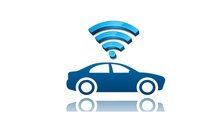 Cars are
becoming much more connected.
Cars are
becoming much more connected.
While the promise of self-driving cars becoming mainstream is a number of year away, many more cars are joining the Internet of Things.
The trend is not
new; it’s just becoming much more visible.
Many carmakers saw the impact of car connectivity coming, but the lead time for IoT car features still can be quite lengthy. At CES in Las
Vegas more than two years ago, General Motors showed mobile apps being integrated into dashboards of its future cars.
Now there’s even a new vehicle called the Internet car. That
smart car, technically named the RX5, was just introduced by Chinese powerhouse Alibaba.
The car, to be mass produced by SAIC Motors, comes with its own operating system. The idea is that the
driver can pay for things through that system rather than via mobile device, in this case using Alibaba’s online Alipay service.
advertisement
advertisement
In addition to cars created for the Internet of Things,
major manufacturers are adapting to bring their vehicles onto the network.
This matters for marketers since many of the connected car features involve the need for new information and
entertainment streams.
Cars also are being wired so that they can connect with other devices, such as those at home.
For example, BMW plans to link its cars to an owner’s house
so it can manage such things as a home heating or air conditioning system. All cars in the U.K. already have a SIM card built in, which enables connectivity.
Earlier this year, BMW launched
its smart home control, which enables owners to adjust home appliances from the car. One of the car-home connection ideas is that the car can communicate with other devices in the house to inform the
driver that traffic will impact a coming trip before the person gets into the car to start the drive.
This is not just rolling out, since there already are half a million BMW’s in the
U.K. that already are connected.
Longer-term, BMW is working with Intel on autonomous vehicles, with a 2021 timeframe.
Other automakers also are looking at car-home connectivity.
Volkswagen this week said it is working with South Korea’s LG Electronics to develop a connected car platform so cars can communicate with external devices.
The idea there is that a
driver could monitor and control home devices like lights and security systems from their car. In addition, in-vehicle entertainment technologies and an alerting system would provide real-time
recommendations to the driver, opening up potentially new marketing opportunities.
Despite all the current car connecting activity by automakers, it’s still going to be some time before
all cars are on the net.
The average car in the U.S. is more than 11 years old and it generally takes as long as 20 years before most cars are replaced. Industry estimates say it will be 2025
before all new cars come with Internet connectivity.
One recent study found that more than a quarter (27%) of U.S. car owners would like their car be able to communicate with
Internet-connected devices in their home.
Of course, there need to be more smart devices installed in the home to be connected to the cars, since a likely driver of connected cars will
be the growth of smart homes.
The connected car need something to connect to.
-----------------------------------------------------------------------------------------------
Marketing in connected homes? Come hear Trevor Guthrie of Giant Spoon, Dino Hainline of Midnight Oil, Greg Hedges of Rain and Jeff Suhy of Modop at the MediaPost IoT Marketing Forum Aug. 3 in New York. Check it out the agenda here.